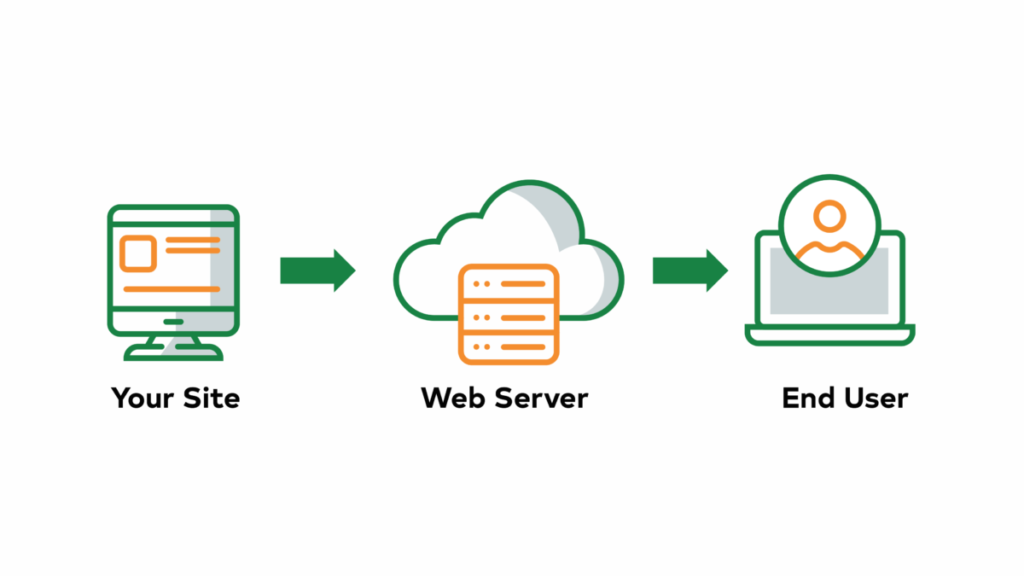Your Guide to Enterprise Website Hosting
Enterprise websites handle high traffic demands, complex integrations, sensitive data and mission-critical functionality. This means hosting isn’t just a technical detail, but a foundational business decision.

Mark Perry is a Digital Project Manager at Itineris, dedicated to fostering strong client relationships and driving success through innovative digital solutions. With a focus on clear communication and collaboration, he ensures every project aligns with client goals, delivering exceptional results and creating long-term value for all stakeholders.
Enterprise website hosting is about so much more than just keeping a site online. It’s about giving your organisation the tools, performance and security it needs to operate at scale.
Even though it works ‘behind the scenes’, every interaction and experience a user has with your brand online is, ultimately, built on your hosting platform. So, you need to make sure your hosting environment actively supports your enterprise digital presence.
Here’s what you need to know to get it right.
Why Proper Enterprise Website Hosting Matters
The right hosting solution gives you three essential things: performance, protection and potential.
First, performance. Enterprise websites need to be fast.
Whether it’s a customer-facing site, an internal portal or a transactional platform, speed is non-negotiable.
Slow load times cost conversions, damage search rankings and frustrate users. A high-performance hosting environment – backed by powerful servers, caching layers and load balancing – makes sure your site stays fast, no matter the demand.
Next, protection.
Enterprise websites are prime targets for cyberattacks. DDoS attempts, data breaches and malware injections are real threats. Proper hosting adds layers of defence through firewalls, intrusion detection, real-time monitoring, automated patching and secure backups.
You also need compliance-ready infrastructure. If you’re in finance, healthcare, law or eCommerce, your hosting needs to meet specific regulatory standards, like PCI DSS, HIPAA, or ISO, for example.
Then there’s potential, or scalability.
Enterprise websites don’t stay static. They grow, evolve and occasionally spike under pressure. Think product launches, seasonal campaigns or crisis traffic.
If your hosting can’t flex on demand, you’ll hit a ceiling – and possibly lose business. Scalable solutions like cloud or hybrid hosting let you expand your capacity instantly, without downtime or migration headaches.
Enterprise hosting also supports complex integrations. You might be connecting to CRMs, ERPs, marketing stacks or custom APIs.
Hosting must be robust enough to handle all of that smoothly. And if you’re running on WordPress or another CMS, you need a host that understands its architecture inside out – especially at scale.
Ultimately, hosting isn’t just simple infrastructure to get your website up and running. It’s part of your digital strategy. Get it wrong, and everything else suffers, including performance, security, SEO, user experience and even your reputation.
That’s why enterprise website hosting is one of the most crucial considerations when building or upgrading your site. It underpins everything.
Types of Enterprise Website Hosting
Not all enterprise websites are the same. Some need huge amounts of power. Others need to flex up and down as traffic changes.
That’s why there are different types of hosting solutions available. Each one is built for different needs, budgets and priorities.
The first and most powerful option is dedicated hosting. With this setup, your business gets an entire physical server to itself. Nothing is shared.
This means high performance, full control and top-level security. It’s ideal for websites that handle large amounts of data or sensitive information, or that need guaranteed uptime and stability.
It’s also the most expensive option, but for businesses where performance and control are critical, it’s well worth it.
Next is cloud hosting. This is a flexible, scalable solution that pulls resources from a network of virtual servers. You only use what you need, and you can scale up or down.
It’s more cost-efficient and useful for growing businesses or websites with unpredictable traffic patterns. You’re not tied to a single piece of hardware, which also adds resilience – if one server fails, another takes over.
Then there’s managed WordPress hosting. This is specifically built for WordPress websites, and it’s the ideal choice if you want expert support and maintenance handled for you. It includes features like automated updates, backups, built-in security and performance optimisation.
Managed WordPress hosting is often used by content-heavy websites, marketing teams or publishers who need a fast, reliable WordPress platform without managing the technical setup.
Some enterprise solutions even combine multiple types – like a hybrid approach using both dedicated and cloud resources. This gives you the best of both worlds: control where you need it, and flexibility where you don’t.
Choosing the right type of enterprise hosting comes down to your site’s size, structure and role in your business. Think about performance needs, traffic volume, security requirements and how fast your organisation is growing.
This all means there’s a lot to consider in the right hosting type, as it supports your entire digital strategy. So, before simply choosing a hosting solution based on cost or ease of use, consult with digital experts on your technical requirements and digital growth plans.

Benefits of Enterprise Website Hosting
The right hosting solution does far more than you might think. It protects your brand, supports organisational growth and unlocks long-term value.
Here are some of the main benefits you’ll experience from the right enterprise website hosting solution.
The most obvious one is better performance.
Enterprise-grade hosting environments are built for speed. That means faster page loads, smoother interactions and better user experience.
With search engines factoring speed into rankings, your hosting plan directly affects your website’s visibility too. Whether you’re handling millions of page views, high-volume transactions or content-heavy pages, your hosting must deliver a fast and frictionless experience.
Then there’s uptime and reliability.
Downtime is expensive, as it means lost revenue, lost leads and lost trust. Enterprise hosting solutions are designed with redundancy in mind.
Failover systems, load balancing and uptime monitoring all work together to keep your site available 24/7. Some providers even offer service-level agreements (SLAs) guaranteeing 99.9% uptime or higher.
Security is another major advantage, as enterprise websites are high-value targets for cyberattacks.
With enterprise hosting, you get firewalls, DDoS protection, regular patching, advanced threat detection and real-time monitoring. These measures reduce risk and help ensure compliance with data protection laws and industry regulations.
Scalability is also a key benefit. Enterprise sites are always growing, evolving and often need to handle sudden spikes in traffic.
With enterprise hosting, you can scale resources up or down as needed, without affecting performance. This is especially important for campaign-driven businesses, media companies or organisations going through digital transformation.
You also get expert support. Most enterprise hosting providers offer round-the-clock technical support, often with dedicated account managers and engineers who understand your specific setup.
When something goes wrong, or when you need to make changes, you’re not stuck in a support queue. You’re working with people who know your environment and can act fast.
Finally, the right enterprise hosting gives you more say in how your server is configured. Whether you need custom firewall rules, containerised apps or specific server-side technologies, you’re not limited by the constraints of basic hosting plans. This flexibility is essential for complex digital ecosystems.
How to Choose the Right Enterprise Website Hosting Solution
Choosing an enterprise website hosting solution isn’t just about picking the fastest or most expensive option. It’s about finding the right fit for your organisation’s goals, infrastructure and growth plans.
What works for a global eCommerce platform might not suit a law firm or a higher education provider.
So how do you decide?
Here are some of the key factors to consider.
Performance
Your hosting solution should offer consistently fast load times – regardless of traffic spikes, page complexity or content volume.
Look for providers that use high-spec hardware, SSD storage and global data centres. Features like built-in caching, content delivery networks (CDNs) and load balancing all help keep performance stable under pressure.
Scalability
Enterprise websites need to grow and adapt. So, your hosting must scale resources up or down without causing downtime or requiring replatforming.
Cloud-based or hybrid solutions are often best for this, as they allow flexibility without sacrificing control.
Security
For an enterprise website, you need more than the basics. Enterprise-grade hosting should include 24/7 threat monitoring, intrusion detection, firewalls and DDoS protection.
Encryption, both at rest and in transit, should be standard. And if you handle sensitive data, your host must support compliance standards like GDPR, PCI DSS, HIPAA or ISO 27001. Understand what security protocols are in place and how often patches and updates are applied.
Reliability
Reliability and uptime guarantees also matter. Look for hosts that offer a minimum 99.9% uptime SLA. Redundant infrastructure, backup power and automated failover systems all contribute to stability.
And daily or real-time backups with fast recovery options are essential if something goes wrong.
Support
Support from hosting providers is often overlooked, but at the enterprise level, it’s critical.
You need dedicated, expert support available 24/7. Ideally, you should have a direct line to someone who understands your setup – not just a generic helpdesk.
Managed services, proactive monitoring and hands-on technical assistance can make all the difference in an emergency.
Customisation and Integrations
If you need to connect with CRMs, ERPs, marketing platforms or analytics tools, your host must support that. Some providers even offer tailored environments optimised for specific CMSs, like WordPress VIP.
Look for platforms that give you root access, staging environments and support for your preferred tech stack.
Also consider geographic reach. If your audience is global, choose a host with data centres or CDN nodes in your key markets. This reduces latency and improves regional performance.
The Best Enterprise Website Hosting Solution
With all things to consider, finding the best enterprise website hosting comes down to many technical factors. Most importantly, your hosting provider needs to align with your digital presence, your website demands, your technical infrastructure and your future plans.
Choosing a hosting provider isn’t a decision to base entirely on cost or what might seem easiest. It’s a crucial part of your digital presence, and your hosting choice must align with your website development plans. That’s why you need to work with a team that has the technical and strategic expertise when making a crucial decision like this.
At Itineris, we specialise in enterprise WordPress development. We understand the unique needs of large-scale websites and ensure every project we work on is built with an optimal hosting solution. Get in touch to discuss how we can transform your enterprise website presence.




